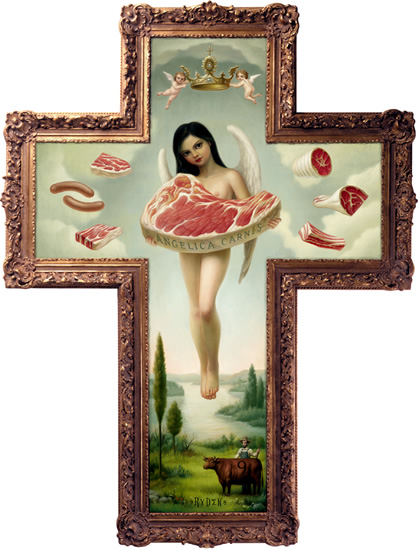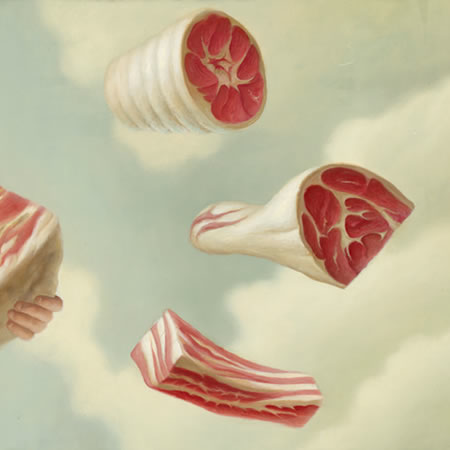
Diet and Discipleship

There are 850 million hungry people in the world. We feed 72% of all grain grown in the world to livestock. Both of these statements are true, and there’s something incredibly disturbing about that.
After thinking about the relationship between these two numbers (850 million and 72%), my community in Miami decided to fast from meat one day a week during Advent and Christmas. We thought this was an appropriate way to celebrate the coming of Christ. And we’re pretty sure that Mary, the mother of Jesus, would agree.
In Luke’s gospel, after learning that she is pregnant with long-awaited Christ, Mary lets loose a powerful song often referred to as the “Magnificat” (that’s the first word in the Latin version). Here are the opening lines:
My soul magnifies the Lord,
and my spirit rejoices in God my Savior,
for he has been mindful of the lowliness of his servant.
Mary is bursting with joy and excitement. What for? She knows that through the birth of this baby boy, God is bringing justice to where it does not yet exist and rescuing those who are always being bullied around. She goes on to sing,
He has brought down rulers from their thrones
but has lifted up the lowly.
He has filled the hungry with good things
but has sent the rich away empty.
The historian Thomas Cahill calls the Magnificat “the most muscular poem in all of ancient literature.” This isn’t some cute little Christmas carol – this song is explosive and fiery. Mary is announcing to the world that the baby inside her womb is going to grow up to be an agent of radical social change.
That’s what makes our Christmas traditions today so bizarre. We’ve come to associate Christmas with eggnog, Rudolph, and buying one another new trinkets (this year Americans spent $500 billion on Christmas), but for Mary, Christmas was about God “lifting up the lowly” and “filling the hungry with good things.”
This line about the hungry being fed – that’s why our community decided to have a weekly no-meat day this season. The birth of Jesus doesn’t just have spiritual meaning; it has social implications. We think the Magnificat and Meatless Mondays belong together.
There are strong environmental arguments for cutting back on meat consumption. Producing meat makes a 40% greater contribution to global warming than all transportation in the world combined. It accounts for a fifth of all greenhouse gas emissions. There are also health reasons. The average man in the U.S. with a meat-based diet has a 50% chance of dying from heart disease. Reducing meat greatly reduces this risk, as well as risk of cancer and stroke. Then there’s the issue of how animals in the meat industry are treated. They live in overcrowded, inhumane environments and are pumped full of hormones and antibiotics. We think very little of this when buying meat at the grocery store.
So there are various reasons to reduce meat consumption, but my main beef (pardon the pun) lies with world hunger. As I said earlier, there are nearly 1 billion people starving in the world, yet we feed 72% of all grain grown to livestock so we can have meat at every meal. No civilization has ever eaten meat 2-3 times a day; only kings and royalty were afforded that privilege in the past. But we’ve come to expect it. As a friend recently said to me, “I don’t feel like I’ve had a meal unless I’ve had meat.”

Let’s talk specifically about beef. We now use ¼ of the earth’s land to graze cattle. According to research done at Cornell University, one acre of land can produce 50,000 pounds of tomatoes or 40,000 pounds of potatoes – but that same acre of land can only produce 250 pounds of beef. And to produce a pound of beef requires 10,000 gallons of water, whereas one pound of wheat requires 25 gallons of water. The high demand for beef in America and Europe means that much of Central and South America’s agricultural land has been transformed into pastures for raising beef that is then exported to Western nations. As the authors of A Better World Handbook put it, “The end result is that the wealthy of the world eat grain fed beef while over a billion people go hungry each day due to a lack of grain.”
I don’t have the best memory, and that’s partly why I do this – so I don’t forget how a large portion of the world lives. Forgoing meat one day a week is a small but tangible way to have solidarity with those who are without. It also helps us learn to eat less meat so others can simply eat.
Now don’t get me wrong, I love me some meat. That’s something I and T-Rex have in common. I’m not trying to hide that fact. Nor am I advocating that we give up meat altogether. I have the upmost respect for vegetarians and vegans, but I haven’t chosen that path. I don’t think it’s wrong to eat meat. But I do think it’s wrong to never consider how eating meat affects our global neighbors. Our current meat consumption in the West is excessive and unethical; I’m suggesting we develop eating habits that are sustainable and loving toward others. This could be accomplished through a low-meat diet.
But whereas we have a way of identifying people who eat no meat as vegetarian, we don’t yet have a term for people who make a conscious effort to limit how much meat they eat. (Although I should say I’m not upset that “ecotarian” and “meat reducer” never caught on.) Because of our all-or-nothing approach to meat eating, the concept of a low-meat diet – and the reasons for it – still remain foreign to most Americans, yet we’re ever ready to learn about and try out the latest diet fads (Atkins, the South Beach Diet, Weight Watchers, etc.).
Not just appetite but also ethics
It was about two years ago when I first learned the connection between our meat consumption and world hunger. I knew something in my diet had to change if I was to have integrity. As the farmer and writer Wendell Berry has said, “Once our personal connection to what is wrong becomes clear, then we have to choose: we can go on as before, recognizing our dishonesty and living with it the best we can, or we can begin the effort to change the way we think and live.”
I knew something needed to change, so I began refraining from meat one day a week. I was able to get a handful of friends to join me, including the chef at the seminary where I was studying at the time.
I also asked a good friend in England to take part in the fast, but he informed me that he already has a low-meat diet (on average he eats meat three times a week). Nevertheless, he thought of another way to join us – by fasting from beer. It takes an absurd amount of grain to make beer and other alcoholic beverages, an amount that easily could feed millions of hungry people. (The alcohol industry in the U.S. alone uses 5.2 million tons of grain – enough to feed 26 million people in India.) My friend was in the habit of having a pint of beer with dinner each evening, so he decided to start forgoing his pint a few days a week. I’m sure there are more ways we could rearrange our eating habits to be more mindful of those in our world who are without. All it takes is a little imagination. And, of course, concern for the wellbeing of others.

I’ve used a painting by Mark Ryden in this post, titled “The Angel of Meat.” I debated whether to include it since I know some will find it offensive, but I decided to do so because I feel it ties together in an unusual way the two themes of diet and discipleship. I’m not entirely sure what Ryden intends for this piece to convey, but I’d like to offer an interpretation in the context of our current discussion.
We’re being offered a large scrumptious porterhouse, as well as all the other meats we as Americans have grown to love. But having now learned how our high-meat consumption effects others in the world and renders millions of people without the daily subsistence needed to live, this choice of whether or not we have the steak is no longer only about appetite and preference. This is now an ethical decision. And for those who profess faith in Jesus, this is now a matter of discipleship. The painting itself is framed within a cross. Our diet has to do with following Jesus.
Living “as if” people matter
My community here in Miami committed to doing Meatless Mondays during Advent and Christmas, which means that today is our last fast together. My hope is that this small exercise has made us more aware of the social impact of our dinner plates, and thus is helping us form new eating habits that better reflect our convictions. So perhaps this isn’t the end but the beginning.
Maybe you’d like to start fasting from meat one day a week. And these things are always more fun when done with others, so you could ask some friends to join you. I send a text message to my friends every Monday morning as a reminder – that’s all it takes. Imagine the impact we could have if enough people starting doing this. Who knows, maybe it would spark a chain reaction of behavioral change, leading people to cut back on meat, move toward a more plant-based diet, and grocery shop with their global neighbors in mind. That, in turn, would free up a massive amount of grain, not to mention land and water, which could then be channeled toward feeding millions of hungry people.
There’s a chance this domino effect could happen. Or not. Maybe the majority of Westerners will go on giving in to their carnivorous cravings and further perpetuating the global inequality of food distribution in our world. We can’t know beforehand if a small act like a weekly meat fast will have a larger impact, but it’s worth doing if for no other reason than at least you will have begun to close the gap between what you think and what you do.
In a brilliant essay featured in The Guardian in 2008, Michael Pollan addresses why we should bother making small changes in our lifestyle in hopes of bringing greater change. “Sometimes you have to act as if acting will make a difference, even when you can’t prove that it will.” Pollan goes on to illustrate this with what happened in Communist Czechoslovakia and Poland when a group of folks resolved that they would simply conduct their lives “as if” they lived in a free society. “That improbable bet created a tiny space of liberty that, in time, expanded to take in, and then help take down, the whole of the eastern bloc.” That’s what I’m suggesting we do with our diet, that we develop eating habits “as if” people matter.
Fasting one day a week from meat is something small, but it’s a place to start. Other issues surrounding world hunger must be dealt with (such as poor irrigation, political instability, and access to available food), but Meatless Mondays is something we all could do, and something that could have a larger impact. It’s time we see that ‘what’s for dinner?’ is more than a question of taste and appetite - it has to do with ethics. Something has to be done about the two numbers that this post began with: 850 million and 72%. We need to learn to eat less meat so others can simply eat.